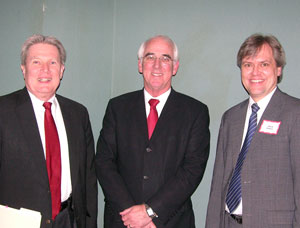 |
Richard Raymond, M.D., USDA Undersecretary for Food Safety, center, with UNMC Vice Chancellor for External Affairs Bob Bartee, left, and UNMC Government Affairs Director Mark Bowen during Dr. Raymond’s visit to the medical center on Monday. |
About 50 people ventured to the Eppley Science Hall Amphitheater to hear Dr. Raymond, a 1972 College of Medicine graduate, during Monday’s UNMC Delegates luncheon.
In his time with the USDA, the department has undertaken several steps to improve food safety for U.S. citizens, Dr. Raymond said. These steps have led to increased detection of food-born illnesses, such as E. coli, he said.
“When I say there are more recalls, that isn’t a completely bad thing,” Dr. Raymond said.
One step the USDA recently took to improve food safety was implementing a database that stores information about the pathogens of food-born illnesses such as E. coli.
Dr. Raymond discussed a recent outbreak of E. coli in Wisconsin that officials initially thought originated in beef. Thanks to information from the database, it was later determined that this particular strain of E. coli, which also appeared in other states, originated in spinach.
Because of the database, officials were able to recall spinach that may have been contaminated, Dr. Raymond said.
The department also is stepping up efforts to educate the public about food safety issues.
Drawing public attention to such issues through the media, Web resources and other outlets could go a long way toward decreasing food safety incidents, Dr. Raymond said.
Dr. Raymond was appointed to his current post in July 2005 by then Secretary of Agriculture and former Nebraska Gov. Mike Johanns. In his job, Dr. Raymond is responsible for overseeing the policies and programs of the USDA’s Food Safety and Inspection Service.
|
|
Bob Bartee, vice chancellor for external affairs, thanked Dr. Raymond for speaking at the event and for his efforts over the years to help UNMC, including acting as a powerful proponent of increasing Nebraska’s public health efforts and securing funding for The Nebraska Regional Poison Center.
“Dr. Raymond is one of the most creative and productive public servants I have ever known,” Bartee said.
The UNMC Delegates Program is a grassroots advocacy program composed of people willing to advocate on behalf of the medical center to federal and state representatives.
The program began in August 2006, and consists of about 300 alumni, students and friends of UNMC, as well as faculty and staff. Anyone willing to advocate on behalf of UNMC is encouraged to become a delegate.
The free program uses e-mail to communicate with delegates regarding issues of importance to UNMC. Delegates receive informational e-mails regarding congressional and state legislative developments and are called to action when crucial issues arise.
Members also are invited to attend an annual dinner as well as delegates-only quarterly events, such as the speaker series with Dr. Raymond.
Past speakers include Duane Acklie, chairman of Crete Carrier Corporation; Joann Schaefer, M.D., Nebraska’s chief medical officer; Joel Johnson, M.D., Nebraska state senator and UNMC alum; and Tom Rosenquist, Ph.D., UNMC vice chancellor for research.
Visit www.unmc.edu/dept/unmcdelegates to become a delegate.